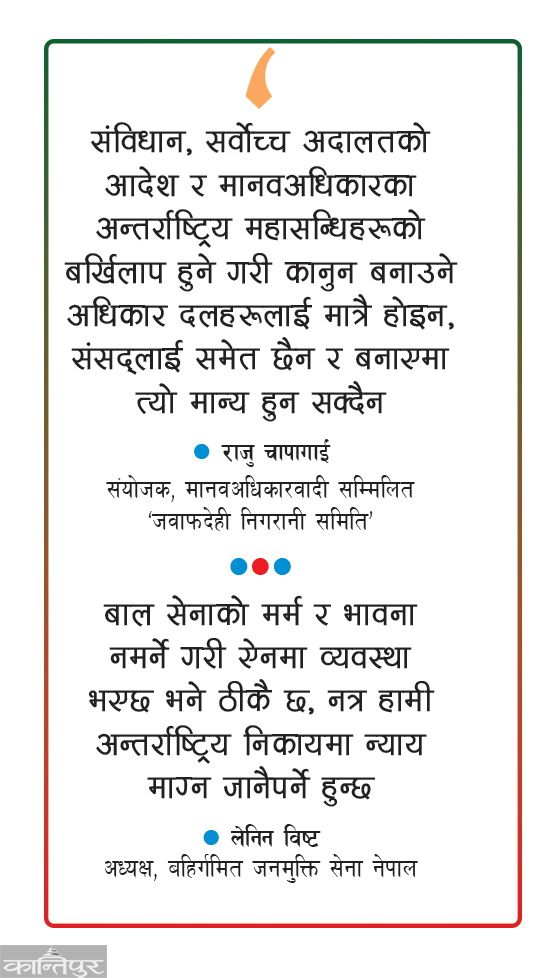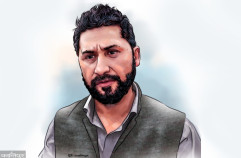Serious Human Rights Violations During Armed Conflicts: Human Rights Defenders' Objection to 75 Percent Conviction

We use Google Cloud Translation Services. Google requires we provide the following disclaimer relating to use of this service:
This service may contain translations powered by Google. Google disclaims all warranties related to the translations, expressed or implied, including any warranties of accuracy, reliability, and any implied warranties of merchantability, fitness for a particular purpose, and noninfringement.

Highlights
- The opposition said that the tripartite agreement between UML, Congress and Maoists regarding the reduction of punishment is against the international convention, the constitution of Nepal and the prevailing laws and therefore it cannot be accepted.



Human rights activists have objected to the tripartite agreement to set the punishment for those involved in serious human rights violations during the armed conflict up to 75 percent less than the existing law as 'against the rule of law'.

The 'Accountability Monitoring Committee', which includes human rights activists, issued a statement on Thursday saying that the agreement between the three major parties, Congress, UML and Maoists, to reduce the punishment for the perpetrators, is not acceptable as it is against the International Convention on Human Rights, the Constitution of Nepal and the prevailing laws. requested the party.
They also asked the parties to bear in mind the fact that the basic mantra of transitional justice is the right of victims of human rights violations to effective legal remedies. It is mentioned in the statement that the decision to extinguish this right of the victim directly or indirectly is not valid.
"The right to effective legal treatment of victims of serious violations is guaranteed under the Constitution of Nepal (Article 21) and international legal standards accepted by Nepal (including Article 2 of the Covenant on Civil and Political Rights)," the statement said, "This right is eternal (peace, armed (conflict or crisis period) cannot be made in a way that contradicts the constitution and international human rights law.'' "It does not mean that the big parties agree to anything, no matter how big the agreement is, it cannot go against the rule of law," says Raju Chapagain, coordinator of the committee. He says that the parties must take into account the fact that they cannot go against the rule of the
law. The monitoring committee argues that since only the court has the authority to determine the punishment according to the amount of the crime, the rights vested in the court cannot be taken away by party agreement.

'It is not appropriate to bind the judiciary to the decision of granting immunity from punishment to the perpetrators of serious crimes by setting a percentage by the law as it interferes with the independence of the judiciary and violates the right of the victim to effective legal treatment.' The right to justice is lost.'' The committee urged representatives from all three parties to "abandon the option of extinguishing criminal accountability for serious crimes".
On behalf of the Congress, UML and Maoists respectively, the working group consisting of Ramesh Ukhar, Mahesh Bertaula and Janardan Sharma, respectively, agreed on Tuesday to put a provision to reduce the punishment of those involved in war crimes up to 75 percent by speeding up the discussion on the issue pending agreement on the TRC law amendment draft pending in the Parliament. They also agreed on what constitutes a serious human rights violation on Tuesday. Accordingly, brutal killings and premeditated killings will be defined as 'serious violations of human rights'.
Human rights activists have also objected to this definition. They demand that this error in the definition of serious violation of human rights be corrected. The committee says that the commissioner selection process should be made open and transparent, the independence and autonomy of the commission should be fully guaranteed, the limitation of limitation should be removed in the prosecution of serious crimes, and it should be ensured that crimes that cannot be pardoned or reconciled are prosecuted. It is also requested to pass the pending bill with amendments so that the demands raised by the
victim community and civil society in the past will be addressed and to bring the blocked transitional justice process on the right track. In the working group's discussion on Friday, it is being discussed how to include the issue of child soldiers in the law and how to address it if the victim does not consent to other war crimes that are not prosecuted.
Former child soldiers have said that they will knock on the door of the International Court of Justice if the issue of child soldiers is not included in the TRC bill. "It is good if there is a provision in the law so that the spirit and spirit of the children's army does not die, otherwise we will have to go to international courts to ask for justice," said Lenin Bisht, the president of Jan Mukti Sena Nepal, who is involved in the children's army. A separate group should be set up to prosecute the culprits of the child army recruitment case.'
 प्रकाशित : श्रावण ११, २०८१ ०५:५३
प्रकाशित : श्रावण ११, २०८१ ०५:५३

 २२.१२°C काठमाडौं
२२.१२°C काठमाडौं











